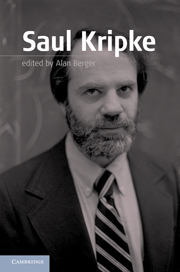Book contents
- Frontmatter
- Contents
- List of Contributors
- Introduction to Kripke
- Part I Naming, Necessity, and Apriority
- Part II Formal Semantics, Truth, Philosophy of Mathematics, and Philosophy of Logic
- 5 Kripke Models
- 6 Kripke on Truth
- 7 Kripke on Logicism, Wittgenstein, and De Re Beliefs about Numbers
- 8 Kripke on the Incoherency of Adopting a Logic
- Part III Language and Mind
- Part IV Philosophy of Mind and Philosophical Psychology
- Index
- References
5 - Kripke Models
Published online by Cambridge University Press: 05 June 2012
- Frontmatter
- Contents
- List of Contributors
- Introduction to Kripke
- Part I Naming, Necessity, and Apriority
- Part II Formal Semantics, Truth, Philosophy of Mathematics, and Philosophy of Logic
- 5 Kripke Models
- 6 Kripke on Truth
- 7 Kripke on Logicism, Wittgenstein, and De Re Beliefs about Numbers
- 8 Kripke on the Incoherency of Adopting a Logic
- Part III Language and Mind
- Part IV Philosophy of Mind and Philosophical Psychology
- Index
- References
Summary
Introduction
Saul Kripke has made fundamental contributions to a variety of areas of logic, and his name is attached to a corresponding variety of objects and results. For philosophers, by far the most important examples are “Kripke models,” which have been adopted as the standard type of models for modal and related non-classical logics. What follows is an elementary introduction to Kripke’s contributions in this area, intended to prepare the reader to tackle more formal treatments elsewhere.
What is a model theory?
Traditionally, a statement is regarded as logically valid if it is an instance of a logically valid form, where a form is regarded as logically valid if every instance is true. In modern logic, forms are represented by formulas involving letters and special symbols, and logicians seek therefore to define a notion of model and a notion of a formula’s truth in a model in such a way that every instance of a form will be true if and only if a formula representing that form is true in every model. Thus the unsurveyably vast range of instances can be replaced for purposes of logical evaluation by the range of models, which may be more tractable theoretically and perhaps practically.
Keywords
- Type
- Chapter
- Information
- Saul Kripke , pp. 119 - 140Publisher: Cambridge University PressPrint publication year: 2011
References
- 3
- Cited by

